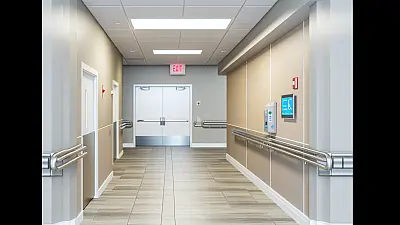LIBERTY, KY - Liberty Care and Rehabilitation Center faced serious safety violations during a June 2024 inspection after a resident sustained a finger laceration when caught in wheelchair spokes and the facility failed to update fall prevention measures following another resident's injury.

Wheelchair Transport Results in Serious Finger Injury
A resident with cognitive impairment suffered a significant finger laceration during routine transport when her hand became caught in wheelchair spokes. The incident involved an Evolution wheelchair, a specialty mobility device that requires specific training for safe operation.
According to the inspection report, staff discovered the injury after transferring the resident to her bed. The Director of Nursing acknowledged the resident "liked to be in control and was non-compliant at times due to decreased cognition," indicating staff were aware of her tendency to grab at equipment during transport.
The facility's response revealed critical training gaps. While the Director of Nursing claimed staff received training on "all equipment in the facility, including all makes of wheelchairs," she could not provide documented evidence that staff received specific training on the Evolution wheelchair prior to the accident.
This type of injury represents a preventable safety failure. Wheelchair spokes pose a known entrapment hazard, particularly for residents with cognitive impairment who may not understand the risks or may reflexively reach toward moving parts. Industry best practices require facilities to assess each resident's specific mobility needs and implement appropriate safety measures before equipment use.
Following the incident, maintenance staff installed spoke covers on all specialty wheelchairs and conducted safety evaluations for all wheelchair users. However, these protective measures should have been in place before any resident used the equipment.
Medical Significance of Wheelchair Safety Failures
Finger lacerations from wheelchair spokes can result in serious complications for elderly residents. The injury mechanism often involves crushing and tearing of skin and soft tissue, which heals poorly in aging populations due to reduced circulation and slower cellular repair processes.
For residents with cognitive impairment, such injuries pose additional risks. They may not properly report pain or follow wound care instructions, leading to potential infections or delayed healing. The psychological impact of painful procedures can also increase confusion and resistance to necessary care.
Proper wheelchair safety protocols require comprehensive resident assessment before equipment selection. This includes evaluating cognitive status, upper extremity function, and behavioral patterns. For residents prone to reaching toward moving parts, spoke guards should be standard equipment, not an afterthought following injury.
Fall Prevention Plan Left Unchanged After Resident Injury
The inspection revealed another serious safety gap when a resident with dementia and a documented fall history experienced an unwitnessed fall that resulted in a skin tear to his right forearm. Despite this incident, the facility failed to update his care plan with additional fall prevention interventions.
The resident, who had severe cognitive impairment with a score of six out of 15 on cognitive assessment, was found on his knees beside his closet door. He told staff he fell while searching for something in his closet. A Licensed Practical Nurse cleaned and dressed the resulting skin tear and notified the physician and family.
However, the resident's Comprehensive Care Plan showed no new interventions following this documented fall. This represents a fundamental failure in individualized care planning, as each fall should trigger immediate assessment and implementation of additional preventive measures.
The facility's own staff acknowledged this standard during interviews. The Unit Manager stated "care plans should be updated immediately with new interventions after a fall in order to attempt to prevent recurrence," while the MDS Nurse confirmed care plans should receive updates "immediately following a fall."
Fall Prevention Standards and Medical Rationale
Falls represent one of the most serious safety risks in nursing home environments, particularly for residents with dementia. Each fall incident provides critical information about a resident's specific risk factors and should inform individualized prevention strategies.
Effective fall prevention requires ongoing assessment and plan modification. When a resident falls while attempting to access belongings in their closet, this indicates environmental factors and behavioral patterns that must be addressed. Appropriate interventions might include relocating frequently needed items, installing motion-activated lighting, or increasing supervision during high-risk activities.
For residents with severe cognitive impairment, fall prevention becomes more complex as they may not remember safety instructions or understand environmental hazards. This population requires heightened vigilance and proactive environmental modifications rather than relying solely on resident compliance with safety measures.
Additional Issues Identified
The inspection also documented communication breakdowns, including failure to provide requested documentation to surveyors and inconsistent reporting of incident details among staff members.
The facility's administrators acknowledged expectations for staff to maintain safety measures and prevent resident injuries, with the Medical Director stating his expectation that staff "provide for the safety and well-being of the residents."
These violations highlight the critical importance of proactive safety measures, comprehensive staff training, and immediate care plan updates following any adverse event in nursing home settings.
Full Inspection Report
The details above represent a summary of key findings. View the complete inspection report for Liberty Care and Rehabilitation Center from 2024-06-14 including all violations, facility responses, and corrective action plans.
💬 Join the Discussion
Comments are moderated. Please keep discussions respectful and relevant to nursing home care quality.